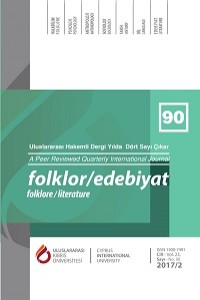EXPLICATING FEMALE BODY AS A GEOGRAPHY OF MEMORY: THE COMPARATIVE SILENT REBELLION OF THE PSYCHE IN CHOPIN AND HAWTHORNE
Öz
What is both ideological and magical about ‘memory’ is the fact that it is both singular
and plural which acts as a bridge between the personal and the collective. The example of
that kind of a bridge is especially represented through literature. In Hawthorne’s The Scarlet
Letter (1850) and Kate Chopin’s The Awakening (1899), the female body is used as a text to
reflect both cultural and personal memory and to define how ‘memory’ is tried to be shaped
by the society. One of America’s first mass-published books, The Scarlet Letter’s protagonist
Hester Prynne illuminates the geography of the female body that rebels against the cultural
memory through wearing the letter ‘A’ on her gown at all times that signifies ‘adultery.’
On the other hand, her silent rebellion has achieved to transform the letter ‘A’ into ‘Angel,’
‘Artist,’ ‘Art,’ and ‘Able’ that is the declaration of independence of the personal memory
over the cultural. Like Hester, in order to escape from the limitations of the cultural memory,
Edna Pontellier in The Awakening rebels against cultural memory and learns to swim in the
ocean and focuses on art which immediately overlap the definition of her role in life. The
comparative analysis of both of the works underline the fact that the female body has been
used as a geography of cultural memory throughout the history. However, Hester and Edna
are significant for the fact that, the psychic device of both women is a silent rebellion which
creates a social space to fight against cultural memory.
Anahtar Kelimeler
The Scarlet Letter The Awakening Memory American Culture Comparative Literature
Kaynakça
- Benstock, S. (2000). The Scarlet Letter (a)dorée, or the Female Body Embroidered. 396- 411.
- Miller, P. (1939). The New England Mind. The Seventeenth Century. Massachusetts: Harvard UP.
- Chedgzoy, K. (2007). Introduction to Gender. In Whitehead, A., Rossingtom M. (Eds.), Theories of Memory A Reader. Edinburgh UP., Edinburgh.
- Chopin, Kate (1972). The Awekening. Braodway: Avon Books.
- Fiedler, L. (1996). Love and Death in the American Novel. New York: Stein and Day.
- Hammond, J. (2000). The American Puritan Elegy. A Literary and Cultural Study. Cambridge: Cambridge UP.
- Haug, F. and Others. (1999). Female Sexualization. A Collective Work of Memory. London: Verso.
- Hirsch, M., Smith, V. (2007). From Feminism and Cultural Memory: An Introduction. In Whitehead, A., Rossingtom M. Theories of Memory A Reader. Edinburgh UP., Edinburgh.
- Kammen, M. (1990). People of Paradox. An Inquiry Concerning the Origins of American Civilization. New York: Cornell UP.
- Kibbey, A. (1986). The Interpretation of Material Shapes in Puritanism. A study of rhetoric, prejudice, and violence. New York: Cambridge UP.
- King, N. (2000). Memory, Narrative, Identity. Remembering the Self. Edinburgh: Edinburgh UP.
- Kuhn, A. (2007). A Journey through Memory. In Susanna Radstone (ed.), Memory and Methodology (pp. 179-197). New York: Berg.
- Kuhn, A. (2007). A Journey through Memory. In Susanna Radstone (ed.).Rossington, Lewis, R.W.B. (1955). The American Adam. Innocence Tragedy and Tradition in the Nineteenth Century. London: Chicago UP.
- Morrill, J. (2003). A Liberation Theology? Aspects of Puritanism in the English Revolution. In Laura Lunger Knoppers. (Ed.), Puritanism and Its Discontents. (pp.27-49). New Jersey. University of Delaware Press.
- Murfin, C.R. (2000) (2nd ed.). In Nathaniel Hawthorne. The Scarlet Letter. Complete, Authoritative Text with Biographical, Historical, and Cultural Contexts, Critical History, and essays from Contemporary Critical Perspectives (pp. 396-411). Boston: Bedford /St. Martin’s.
- Pryse, M.(1979). THE MARK AND THE KNOWLEDGE. Social Stigma in Classic American Fiction. Miami: Miami UP.
- Radstone, S. (2000). (ed.) Memory and Methodology. New York: Berg.
- Ruland, R., Bradburry, M. (2016). From Puritanism to Postmodernism. New York: Routledge Classics.
- Showalter, E. (1991). Sisters’ Choice. Tradition and Change in American Women’s Writing. Oxford: Clarendon Press.
- Wittig, M. (1985). Les guerilles. Boston: Beacon. 110-11.
Ayrıntılar
| Birincil Dil | İngilizce |
|---|---|
| Konular | Dilbilim |
| Bölüm | Derleme Makaleleri -Compilation Articles |
| Yazarlar | |
| Yayımlanma Tarihi | 15 Mayıs 2017 |
| Yayımlandığı Sayı | Yıl 2017 Cilt: 23 Sayı: 90 |
Derginin yayım dili Türkçe ve İngilizce’dir, ayrıca Türkçe de olsa tüm basılan makalelerin başlık, öz ve anahtar sözcükleri İngilizce olarak da makalede bulunur. Hakemlerden onay almış Türkçe makaleler için 750-1000 sözcükten oluşan genişletilmiş özet (extended summary) gereklidir. Elektronik çeviriler kabul edilmez.
Dergi TR-Dizin, Web of Science (ESCI), DOAJ ile diğer pek çok dizin tarafından taranmaktadır. Scimagoe quartile değeri: Q2 'dir:
TR DIZIN 2020 Etik Kriterleri kapsamında, dergimize 2020 yılından itibaren etik kurul izni gerektiren çalışmalar için makalenin yöntem bölümünde ilgili Etik Kurul Onayı ile ilgili bilgilere (kurul-tarih-sayı) yer verilmesi gerekecektir. Bu nedenle dergimize makale gönderecek olan yazarlarımızın ilgili kriteri göz önünde bulundurarak makalelerini düzenlemeleri önemle rica olunur.
Alan Editörleri/ Field Editörs
Halkbilimi/Folklore
Prof.Dr. Hande Birkalan-Gedik (JohannWolfgang-Goethe İniversitet-birkalan-gedik@m.uni-frankfurt.de)
Prof.Dr. Ali Yakıcı (Gazi Üniversitesi-yakici@gazi.edu.tr)
Prof.Dr. Aynur Koçak (Yıldız Teknik Üniversitesi-nurkocak@yildiz.edu.tr)
Prof.Dr. Işıl Altun (Regensburg Üniversitesi/Kocaeli Üniversitesi-İsil.Altun@zsk.uni-regensburg.de)
Doç.Dr. Ahmet Keskin (Samsun Üniversitesi-ahmet.keskin@samsun.edu.tr)
Edebiyat/Literature
Prof.Dr. Abdullah Uçman (Mimar Sinan Güzel Sanatlar Üniversitesi -emekli-29 MayısÜniversitesi-abdullahucman@29mayis.edu.tr
Prof. Dr. Ramazan Korkmaz (Ardahan Üniversitesi-emekli-Kafkasya Üniversiteler Birliği -KÜNİB-r_korkmaz@hotmail.com)
Prof.Dr. Emel Kefeli (Marmara Üniversitesi-emekli-İstanbul 29 Mayıs Üniversitesi-ayseemelkefeli @gmail.com)
Prof.Dr. Zekiye Antakyalıoğlu ( İstanbul Aydın Üniversitesi-zekabe@hotmail.com)
Antropoloji/Anthropology
Prof.Dr. Hanife Aliefendioğlu (Doğu Akdeniz Üniversitesi-hanife.aliefendioglu@emu.edu.tr)
Prof. Dr. Şebnem Pala Güzel (Başkent Üniversitesi-sebnempa@baskent.edu.tr)
Prof.Dr. Derya Atamtürk Duyar (İstanbul Üniversitesi-datamturk@istanbul.edu.tr)
Prof.Dr. Meryem Bulut (Ankara Üniversitesi-meryem.bulut@gmail.com)
Dil-Dilbilim/Language-Linguistics
Prof.Dr. Nurettin Demir (Hacettepe Üniversitesi-demir@hacettepe.edu.tr)
Prof. Dr. Aysu Erden (Maltepe Üniversitesi-aysuerden777@gmail.com)
Prof.Dr. Sema Aslan Demir (Hacettepe Üniversitesi-semaaslan@hacettepe.edu.tr)

